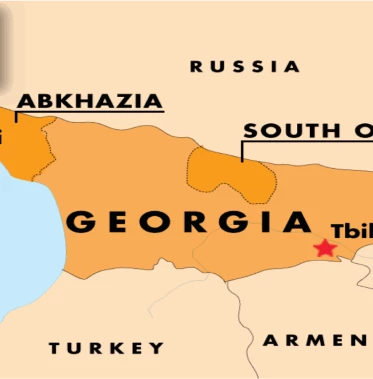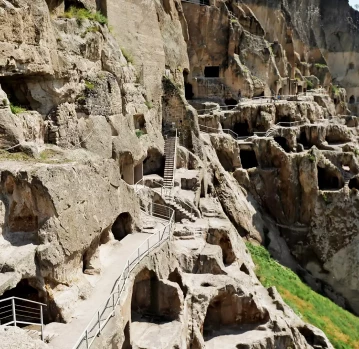Georgia’s geography plays a significant role in shaping its culture, economy, and history. Located at the crossroads of Europe and Asia, this small country is a land of incredible diversity, ranging from the snow-capped peaks of the Caucasus Mountains to the lush vineyards of the Kakheti region. In this article, we will explore the various aspects of Georgia geography and its impact on the country’s identity.

Physical Geography
Georgia geography is characterized by its location at the intersection of Europe and Asia, which has influenced its culture and history. The country’s topography is diverse, with mountainous regions in the north and central areas and a lowland coastal region in the west. Georgia experiences a range of climates, from subtropical in the west to alpine in the highest elevations. The country’s natural resources include timber, minerals, fertile soil, and abundant freshwater sources.
Human Geography
The country has a population of approximately 3.7 million people, which is ethnically diverse, with the largest group being Georgian, followed by Azeri, Armenian, and Russian. The country has a rich cultural heritage, influenced by the ancient Greeks, Persians, and Ottoman Empire. In terms of economy, Georgia is known for its agriculture, particularly its wine industry, as well as its mining and tourism sectors. The capital city of Tbilisi is the country’s largest city and is an important economic and cultural center. This diverse human geography is an important aspect of Georgia’s overall geography.
Regional Variations
Georgia geography varies across its different regions, each with unique characteristics. The western region, bordered by the Black Sea, has a humid subtropical climate and is rich in agriculture and tourism. The eastern region, on the other hand, is more mountainous and experiences a continental climate, with the capital city of Tbilisi located in this region. The Greater Caucasus Mountains characterize the northern region, while the Southern region is home to the Lesser Caucasus Mountains and the fertile Meskheti Plain. Understanding these regional variations is important for understanding the diverse geography of Georgia.

Historical Significance
Georgia geography has played a significant role in shaping its history. The country’s strategic location at the crossroads of Europe and Asia has made it a target of various invaders throughout history, including the Persians, Ottomans, and Russians. Georgia’s mountainous terrain also allowed for the development of isolated and distinct cultures in different regions. The abundance of natural resources, such as fertile soil and mineral deposits, has played a crucial role in the development of Georgia’s economy over time.
Conclusion
In conclusion, the geography of Georgia plays a crucial role in shaping the country’s culture, economy, and history. The physical geography varies from the coastal plains to the high mountain ranges, and the country’s human geography is diverse, with a rich history and vibrant culture. Understanding the regional variations and historical significance of Georgia geography is essential for gaining insight into the country’s development and its future prospects.
Georgia's diverse geography showcases stunning mountains,
valleys, and natural wonders.
Georgia Geography FAQ
Georgia's geography, characterized by its location at the intersection of Europe and Asia, has significantly shaped its culture and history.
3.7 million people.
The largest ethnic group in Georgia is Georgian, followed by Azeri, Armenian, and Russian.
CONTACT US FOR ANY QUESTIONS
Core responsibilities of Human Resource Management

Common Types of HR Services
3box. Culture and different internal policies all have a significant impact on employee retention and engagement. This extremely important for growing businesses and start-ups. For sustainable growth, a big-picture strategy managed by HR professionals or service providers will be key.
It is necessary to develop and maintain a systematized framework to discover opportunities and enhance work performance, while ultimately contributing to the betterment and value of the entity.
Stay ahead in a rapidly changing world
The solution WP consulting came up with combined cutting edge technology with real world practicality. Everyone knew that the systems had to be updated, the real challenge was updating them without disrupting the whole organization in a negative way. The solution was to introduce proper workload management done through computers, while providing mobile platforms to the stakeholders.
This allowed the workers to be involved in the job instead of feeling like they had been made redundant by technology.

The biggest challenge was that Arguzo was not utilizing technology properly. Too much of the work was still being recorded manually, which meant that the numbers took a long time to note down and then to be analyzed. Live data was also not available and decisions can only be made after all the required data and been received. This was holding Arguzo back; they knew they could corner more of the market if they had the ability to be more mobile. The work addressed three critical issues for Pharm Ltd.:
The biggest challenge was that Arguzo was not utilizing technology properly. Too much of the work was still being recorded manually, which meant that the numbers took a long time to note down and then to be analyzed. Live data was also not available and decisions can only be made after all the required data and been received. This was holding Arguzo back; they knew they could corner more of the market if they had the ability to be more mobile. The work addressed three critical issues for Pharm Ltd.:
The biggest challenge was that Arguzo was not utilizing technology properly. Too much of the work was still being recorded manually, which meant that the numbers took a long time to note down and then to be analyzed. Live data was also not available and decisions can only be made after all the required data and been received. This was holding Arguzo back; they knew they could corner more of the market if they had the ability to be more mobile. The work addressed three critical issues for Pharm Ltd.: